We’d now settled in, and I’d returned from NZ with my leg mending but still in plaster. I couldn’t ride a horse but there’d been ample time for me to reflect on what was going to work and what wasn’t. Our family had been made welcome by both the people of Uluisaivou, and our contacts in the High Commission in Suva. We were intrigued by the challenges and determined to make a go of things.
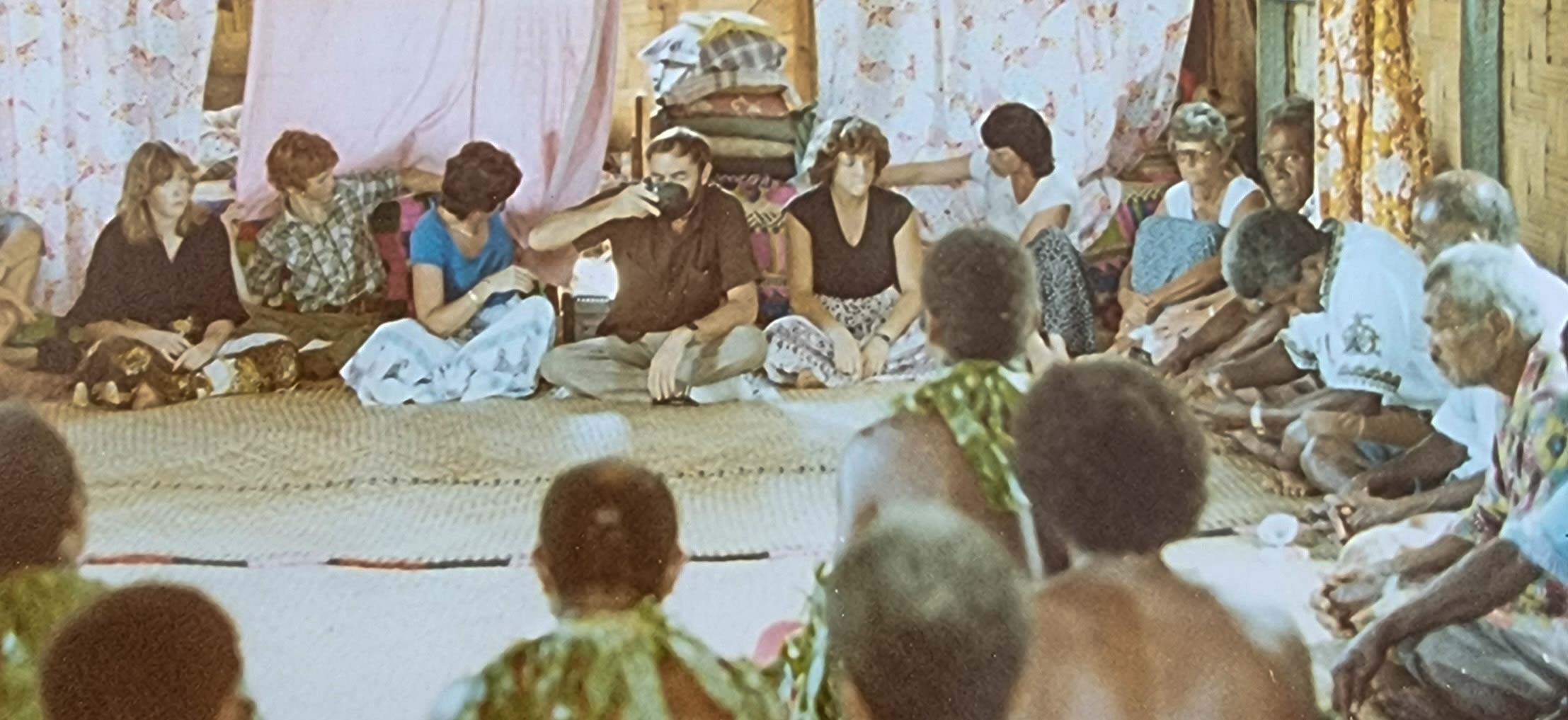
The image above is a Sunday afternoon visit to Nayalevu village. L-R: Nicola, Graeme, Rosie, Me, Joanna, the Trumper family & Villagers.
INTO THE DEEP END
I was christened Ratu Lima. Ratu, according to the dictionary is a title used by Fijians of chiefly rank. And Lima is the numeral five which is close enough to Fife. I had no choice in the matter. My closest ally and friend in Fiji was the chief of Raviravi village. His name was Josefa Maveli, He was a jovial man in his late 60s, with a chiefly demeanor and a marked limp. He just called me Fife.
Late one night during our second or third week I was wakened from a deep sleep by a respectfully urgent voice outside our bedroom window. “Ratu Lima, e dua na lega”. I struggled out of bed and was confronted by Peni who’d been delegated to fetch me. I was to hear the phrase “e dua na lega” regularly. It loosely translates as “there’s a problem.” And the phrase “e dua na lega levu” is more ominous. It means “there’s a big problem.” The problem in this case was a horse belonging to one villager had strayed into the garden of another villager who’d taken to it with a cane knife. Over the ensuing months I had to deal with the result of 4 other intentional machete attacks, one on a man, one on a dog, and two on other horses.
This particular horse was being held by its owner, it was seeping blood, with its head low to the ground. Its stomach wall was visible through the slashed skin of its belly but luckily the stomach itself hadn’t been compromised. It was then I came to realise why we had an industrial strength veterinary kit in our office. The nearest vet was well over two hours’ drive away so the local vet was me, but until now, no one had informed me!
A crowd of onlookers stood around waiting and there was plenty of muscle on hand to help me rope and throw the horse. My mind was racing. I’d need disinfectant……. (tick.) Clamp to help pull the wound together ………., I rummaged through the vet kit…..yes, (tick.) Needle and suture material….yes, (tick.) Skilled knowledge of surgical needle craft…. (blank.) I looked around, no one was stepping up, so it had to be me. I got the job done but by the time I’d finished everyone knew I didn’t really know how to neatly suture a wounded animal, but no one seemed to mind, and the horse survived. The next time we went to Suva I made a bee line for the vet and spent an hour under his watchful eye stitching together the lids on cardboard cartons. We also discussed my veterinary needs and the propensity for the locals to lash out with their cane knives. He suggested some extra bits and pieces for my veterinary toolbox together with some advice on other scenarios I may find useful.
My vet kit came in handy on another occasion. Nicola our oldest daughter contracted a nasty boil on her midriff. We drove to the doctor in Rakiraki about 25km away. The roads were rough, particularly for a short wheelbase 4WD vehicle so these trips were a slow journey. The Doctor said he’d need to administer a course of penicillin. He produced a kidney dish containing a number of used needles, selected the sharpest looking one, dipped it into some medical alcohol and proceeded to give Nicola a subcutaneous injection. Needles in those days were as thick as a small knitting needle so it wasn’t a comfortable experience. He wiped the needle and popped it into the steriliser for re-use and said “you’ll need to come back again over the next two days for another two jabs” I said, “I have a better idea, if you give me some penicillin I’ll administer the next two doses myself.” He was perfectly happy with that arrangement and he gave me the bottle but I declined his offer of a needle. I was able to select two new ones from a fresh packet in my vet kit and so negated the need for two more 50km round trip drives.
THE SEVUSEVU
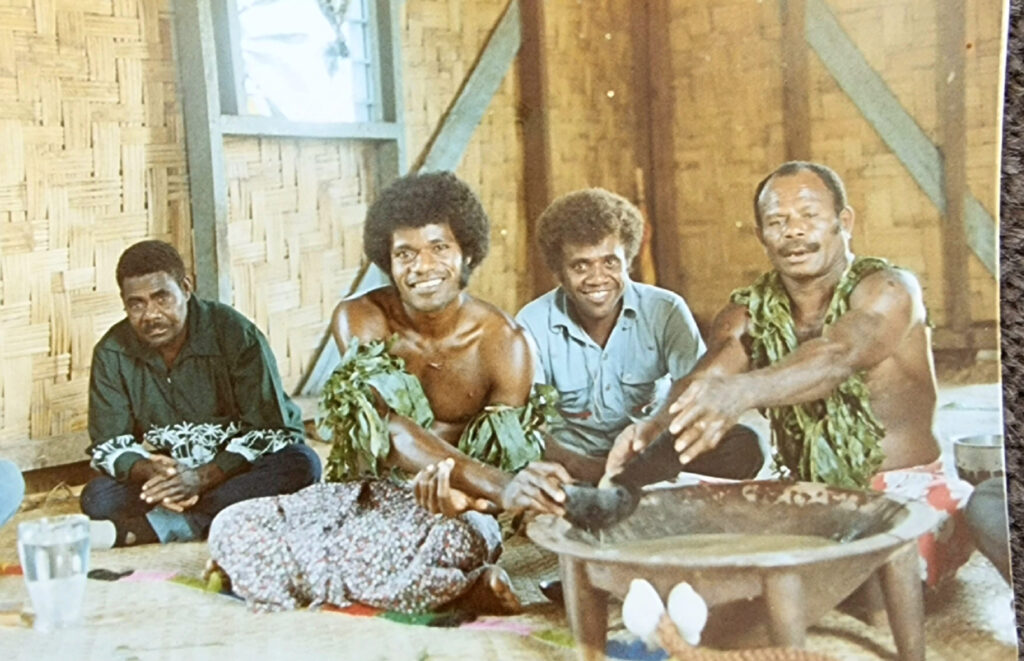
Serving Yaqona from the Tanoa. The man on the left hands the Bilo (cup) to the visitors in front of him (out of picture).
A Sevusevu or Yaqona ceremony is a pivotal part of life in rural communities in Fiji. These rituals are performed in order to gain spiritual approval from the omnipresent ancestors for any important undertaking. If a new fence line is to be built, there will need to be a sevusevu before the first hole is dug. If sugar cane planting is to commence, it will need to be preceded by a sevusevu. At Uluisaivou there was a sevusevu before every board meeting and a sevusevu each day at topdressing season to keep the helicopter safe, ETC.
Yaqona as it is known in Fiji, is a cousin to the pepper plant. It is commonly called Kava by tourists, and by Pacific Islanders from other nations. The roots are dried and thoroughly pounded into a powder, then ceremoniously mixed with water and filtered through a silk cloth before drinking.
Yaqona is a mild barbiturate. It numbs the lips and has an earthy taste. My job necessitated the drinking of gallons of Yaqona over the journey, and I experienced no adverse effects.
Not all Yaqona drinking requires a formal ceremonial sevusevu during its consumption. If the occasion is only for social or convivial reasons, there will be a short incantation before the presentation of the Bilo, (coconut shell drinking cup) to the people sitting cross legged on coconut matting. Then the events of the day will be discussed and as the soporific effect of the drug takes over, conversation slows, and the cares of the day are forgotten.
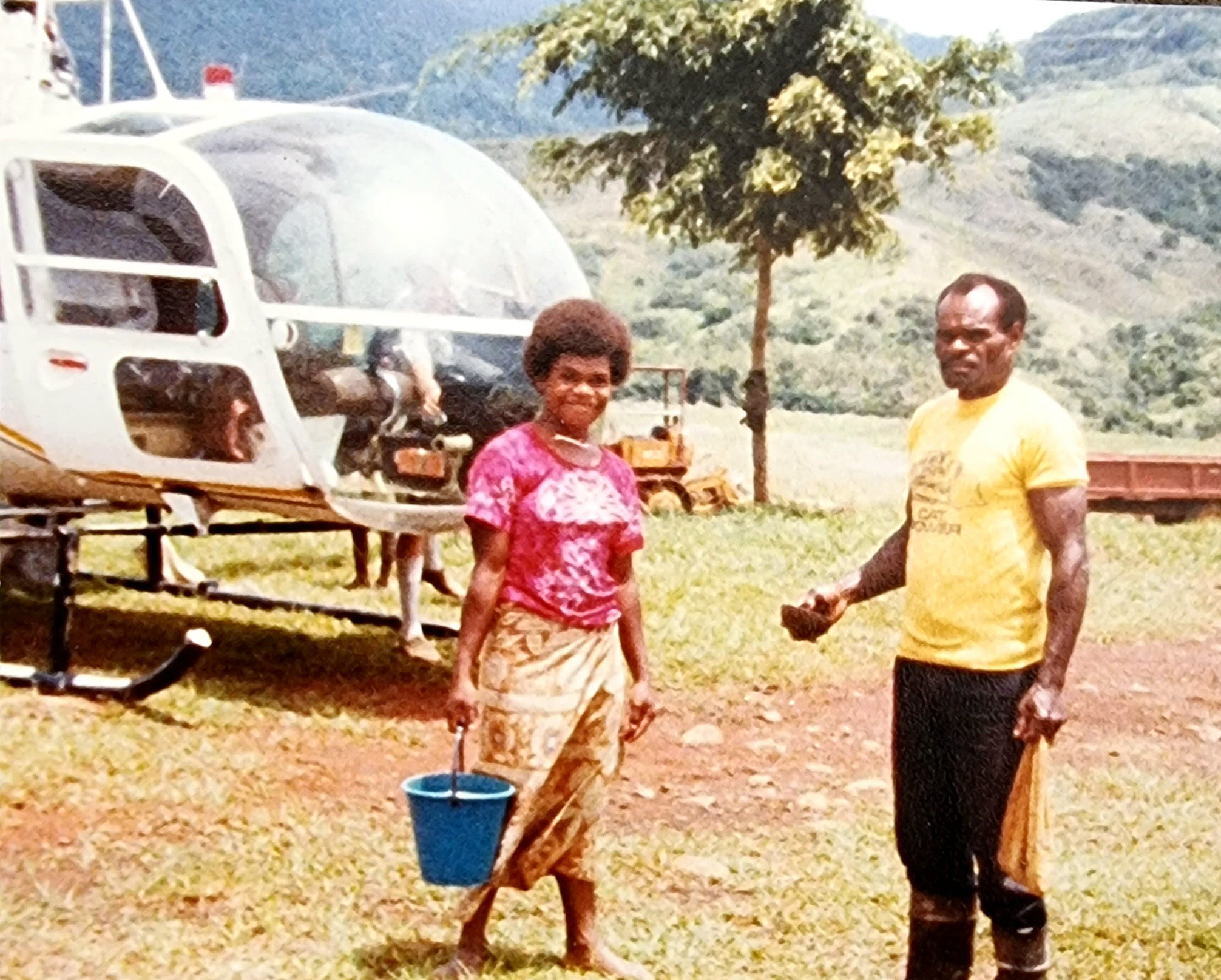
This is Koro the Buldozer Driver conducting a brief Sevusevu before the helicopter starts top dressing.
It is very poor form to go visiting without taking a gift of Yaqona, and a small ritual is necessary before passing the package to the host.
KERIKERI AND OTHER CUSTOMS
The dwellings in the villages were traditional thatched “bures” or a mixture of dwellings with thatched roofs and corrugated iron. Increasingly workers were negotiating to be paid in “covers” instead of money. “Covers” was the local term for sheets of corrugated iron and you would need to work for many weeks to get enough covers to roof a dwelling. Traditional thatched bures were superior both in looks and in comfort, being cooler and perfectly waterproof when new but they degraded over time and required constant maintenance so regrettably there was a relentless tide towards changing from thatched bures to tin shacks. The downside of course was the stifling temperature inside the tin roofed dwellings and the mortal danger from sheets of flying iron during hurricanes. There were always fatalities somewhere in Fiji during hurricane season, caused by death in this way.
Shortly after we took up residence the Uluisaivou board decided to build a bure alongside our house as a neutral venue in which to hold board meetings. It would also double as a recreation centre for staff (and us ….. we put a pool table in it) The accompanying photos illustrate progress on this project.
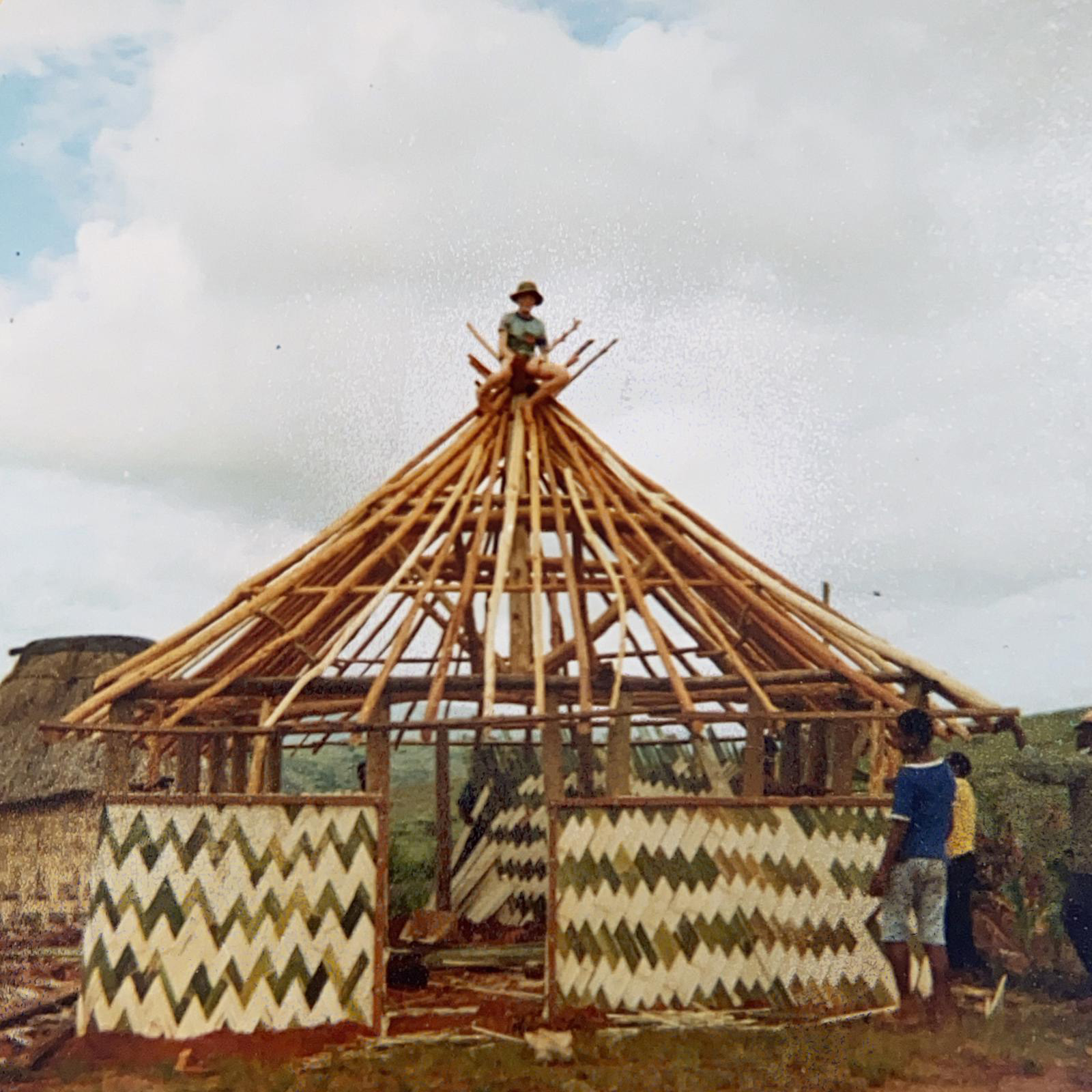
Building a Bure 1
Fiji’s indigenous society is communal with great importance attached to the family unit, to the village, and to the vanua (land.) A hierarchy of chiefs presides over villages, clans and tribes, and chiefly positions are hereditary. Wound into this fabric are taboos and responsibilities significant to Fijians, but unfathomable to most westerners. There is a custom called Kerikeri which still exists. If a respected family member expresses interest in a personal asset you own and kerikeri is invoked, you will lose face if you don’t insist that they take it. This is a big factor in discouraging young people from working hard to get ahead. During my time in Fiji, I saw instances of people industriously gathering a stockpile of roofing iron only to have sheets kerikeried away by others.
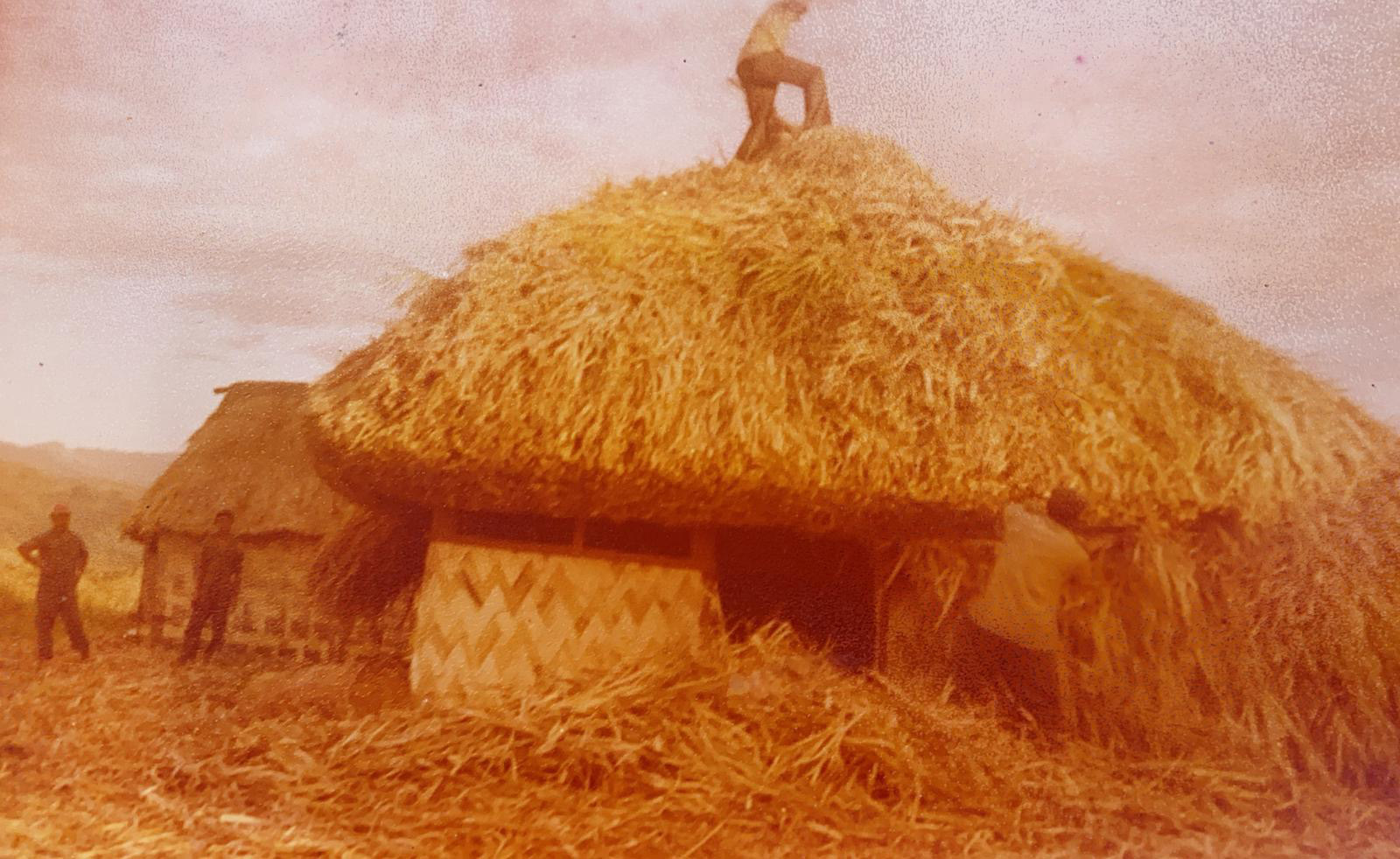
Building a Bure 2
There is a complicated sociological taboo in Fiji based on relationships with cousins. Cousins on one parent’s side of your family can be strictly taboo to you and if you are a woman, you cannot come into close proximity, you must avoid eye contact and if close you should adopt a subordinate attitude. On the other hand, familiarity is perfectly acceptable with cousins of either sex on the other parents side. This taboo complicated things if I was trying to squeeze people into the Land Cruiser. It would not be unusual for a woman to get out and walk rather than ride with a cousin, or alternatively they would crouch on the floor in the back carefully avoiding eye contact.
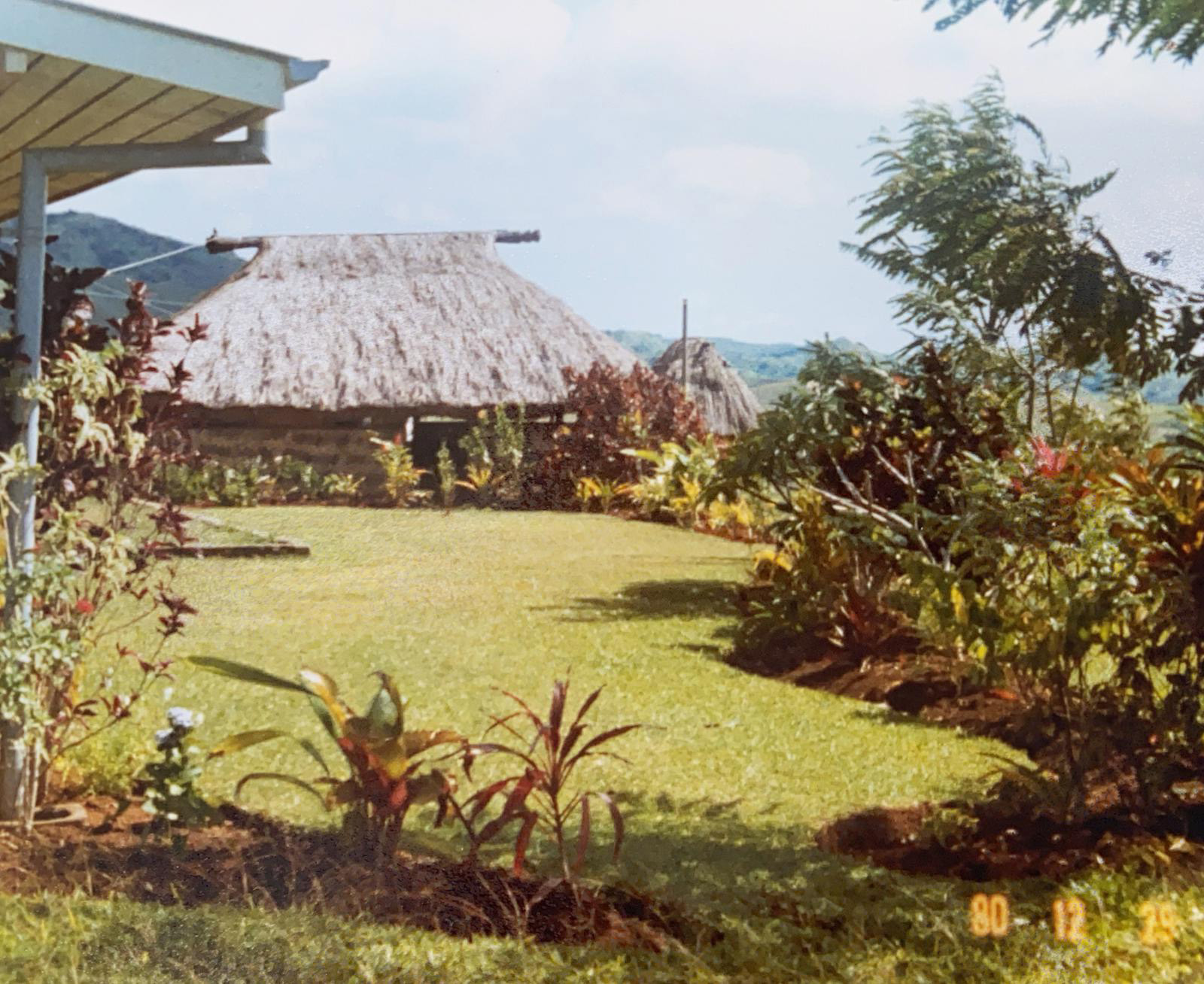
Completed job. Photo taken from our backyard.
RANCH MANAGER’S END-OF-YEAR REPORT TO NEW ZEALAND FOREIGN AFFAIRS DEPARTMENT- DECEMBER 1979
We have almost completed 12 months of our assignment now, and although the year hasn’t been without its difficulties, we are looking forward to our holidays, and to returning after Xmas for our next 12-month stint. We were expecting this to be an isolated posting but the opposite has been the case. The Uluisaivou project has a high profile and we’ve enjoyed a constant stream of interesting visitors.
We had a major setback in May when John Fatiaki my right-hand man, and the one person who had been with the project since its inception, was talked by Fiji Agriculture Department– against his will – into applying for the manager’s position at the Yaqara Pastoral Company. To nobody’s surprise he got the job and this meant that by mid-year I had lost the only other person on the ranch with the training to make informed decisions in my absence.
Supervising labour in a remote location in a developing community has to be experienced to be believed. Our staff here fluctuates between 20 and 40 workers daily. The following are some excerpts from my diary over a busy period, illustrating some of the scenarios that have to be dealt with.
June 11th
Away at 6:00 AM. Isikeli Naitura not working today, as the chief of Rakiraki Village has died. He has to attend. I picked up Koro who didn’t work last week. He maintains his knees were too sore, but has no medical certificate. Went to get Marika but he said his eyes were paining him. He looked OK, so I got him on the job, then took Koro to the bulldozer, but he couldn’t cultivate because the hydraulic hoses on the discs were leaking oil. Sent him to Nawiga to bulldoze roads but he forgot the diesel and was low on hydraulic oil, finally got him started about 10:00 AM. Peni is fencing with four men at Nawiqa, and Eremosi is fencing with 8 men at Korolevu. Had trouble late this morning with two corporation horses getting into Rupeni’s Garden. He was threatening to go to the police. I mollified him then was told there are two of our cattle in Epeli Raginavatu’s garden and a cow in Inosi’s sugarcane. Removed these – luckily there was no need to pay compensation as damage was minimal. Sent Alo and Keni fencing – they made one Taranaki gate and put in one fence post for the day’s work. Toga turned up for work this morning with a bad case of boils so was worse than useless. I made some burners after lunch, and sent Jopi and Joe burning reeds in preparation for the sugar cane cultivation, but the reeds wouldn’t burn – not enough wind. Inosi came up to the office to sell us a horse. Good horse – swapped it for a calf. Sakiusa tells me he wants to buy two yearlings. Six Burelevu men turned up to work to help cart fertiliser for the helicopter, even though I sent a note last Friday to say there’d be no work as the helicopter isn’t coming. They had been waiting for four hours at the manure shed when I discovered them. Apparently Joe forgot to give them the note. Drove them the eight miles back to the village. Three stock-men mustered the horse paddock for six hours and only got 10 steers out of 14. The other three stock-men mustered Vinibau all day, but came back with no cattle at all, and their horses were exhausted. I treated the stallion’s cut leg after taking Tavita to the cattle yards to inspect the steers mustered for tomorrow. They are really too thin to sell but we are overstocked and have no option. Kara told me the cash-box in the office is $40 short and can’t trace where it is gone. She said she has her suspicions! Went to Radio-telephone shack to call Yaqara to organise a horse buying trip there tomorrow, but Radio-telephone out of order.
June 12th
Woken at midnight last night to take Epeli’s wife to the maternity hospital. Just made it in time due to compulsory Sevu Sevu delaying us from leaving. This seemed to take an age as she was already in labour while we had to drink Yaqona! Back to bed at 2:00 AM, up again at 6:00 AM to organise day. Koro bulldozing Namiqa, and Marika, with two other men, are away cutting and spraying wild Yaqona. Alo and Keni on fence repairs worked better today after finally locating wire strainers they’d left at Vuniyaumunu village. Stock-men tried to muster bulls and New Zealand heifers all day- no luck. Sent 10 steers to central meats. Bedford truck motor blew up halfway to Raki Raki mill with a full load of sugar cane on board. Off loaded cane and towed the truck to Naisivalagi. Home for dinner at 10:30 PM.
June 13th
Koro not working- sore knees. Alo started on fence by cattle yards. Keni and Joe weeding pine trees. Marika to start burning again at Nabalabala. Severo and Jopi distributing meal for feeding overworked horses and thin cattle. Fiji Pine Commission came to check on seedling survival at the pine plantation. Ligavi and Jopi towed wounded Bedford from Naiseralagi to our workshop. Centre spread in Fiji Times today describes with photos and glowing story, how the corporation’s General Manager who lives in Suva, has single-handedly developed the ranch to its present high standard. Well done, John. No mention of the Uluisaivou present or past Ranch Managers. Koro has made an impassioned plea for a floor boy to help with the bulldozing. I’ll need to think about it.
June 15th
6:30 AM to radio-telephone shack to order supplies. Marika off work due to Methodist meeting at his house. Nayalevu people spraying wild Yaqona. I went to Nawiga to check on bulldozing and fencing. Went to cattle yards and swapped three heifers for three village horses. Sold two heifers. stock-men sorted out cows from mixed sex yearlings. Bedford Motor stripped down- discovered broken oil ring- having difficulty locating replacement parts. Office work for me this afternoon. Just after knocking off at 6:00 PM, had to take Koro to Namara – his uncle has died- so he says!! Then summoned to Nayalevu village to stitch up a cane knife wound in a horses flanks, then stitched up dog with a partly severed foot-all done in the lights of the Toyota. On to the cattle yards to attend to a cow which proved to have a broken neck. Cow died. Home at 10:00 PM for dinner. Woken up by the men at 1:30 AM with the $60 they had received for selling the meat from the dead cow.
Conclusions
The year has been packed with new experiences I wouldn’t have missed for the world. If one can maintain a sense of humour, the job carries ample reward. I’m pleased to report the madhouse nature of management was alleviated by the arrival of Bernard Trumper and family. He’s now firmly ensconced in the Head Stock-man roll. Three comments are pertinent here.
1. Prompt action to my request for someone to fill this roll was very much appreciated.
2. Bernard threw himself into his new job with enthusiasm. He has been nicknamed “Gaga” (pronounced Ganga ) by the Fijians which means strong or tough. Very high praise in this environment.
3. To pull him out again as planned in April would be a disaster – I will elaborate.
John Fatiaki left us in June, to be replaced by Isakeli Naitura. Isakeli is a Fijian Government Agricultural extension officer. He’s smart, well educated and capable of filling a senior roll but at present he’s available for only two days a week with the balance of his time being spent supervising his Ministry Extension Officers with village small farming projects. There is no way he is qualified or even interested in taking over as a practical leader of the stock-men.
Tevita my previous head, stock-man is about to leave us to take up farming on his own account. He will be sadly missed and difficult to replace. It’s important Bernard stays on as a permanent replacement. It’s interesting to note that the Yalavo cattle scheme, half the size of Uluisaivou, has five experienced Europeans employed. We at present have two.
Approval for my study trip came at a good time. I was tired and losing efficiency and have returned revitalised and secure in the knowledge that Uluisaivou could be viable, provided a 70%, to eventually 75% calving rate, is proven to be economically feasible. I have written a brief summary of our study tour for the board meeting on 14 December, together with some recommendations. I hope the New Zealand authorities will acknowledge the recommendations and help where they are able.
“I have had a memorable year. One might say the experience of a lifetime. My efforts at delegation are ongoing, and during my absence in November, the farm ran on in good Fijian style. If Bernard Trumper has to return to NZ, though, it will be a return to crisis management.”
KW Fife. Ranch Manager
December 1979

Thanks Ken -it was certainly a challenging year for you all but obviously very interesting & rewarding. Loved reading about their customs & traditions too
Hi Jan they were bitter sweet memories.